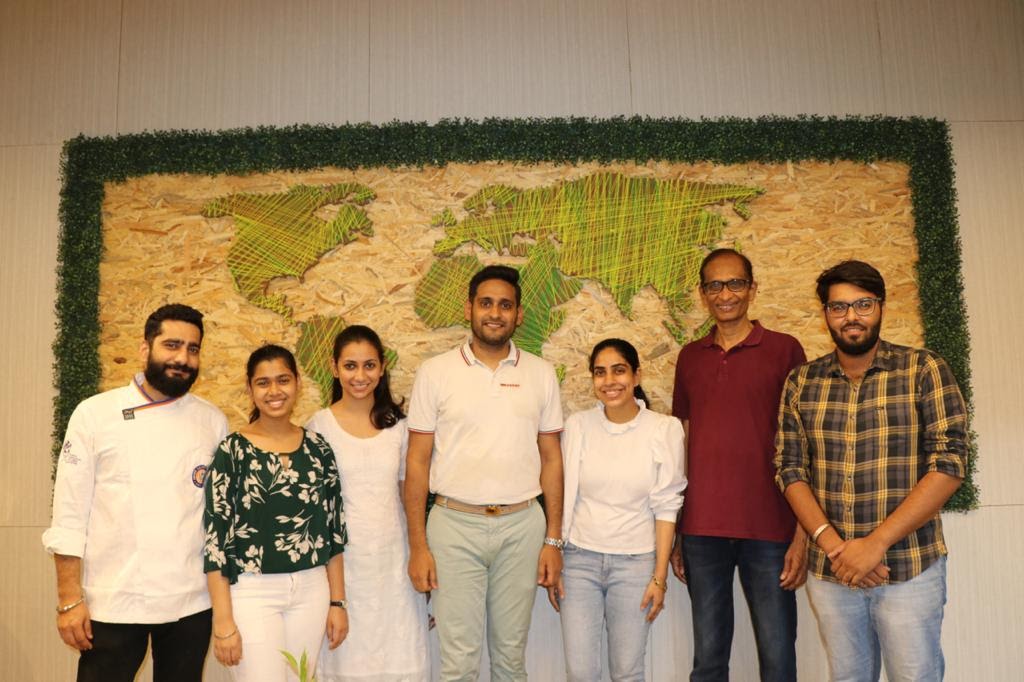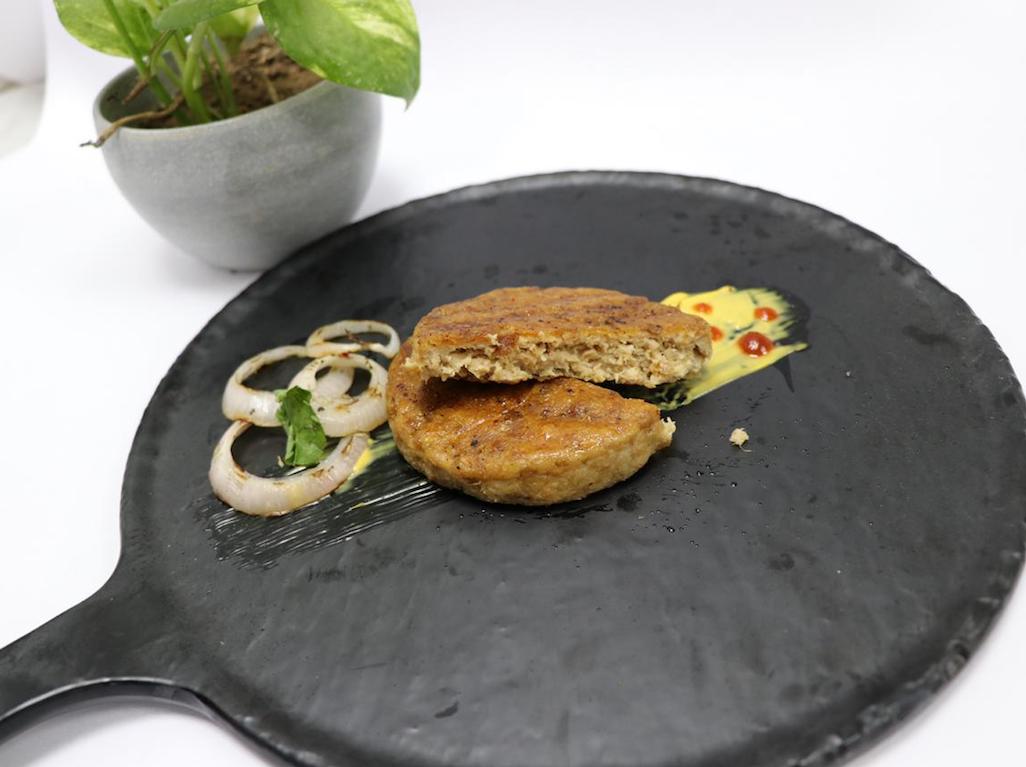Q&A w/ BVeg Foods: “We Want To Become An End-To-End Solution Provider For The Plant-Based Industry”
9 Mins Read
BVeg Foods aims to become a trusted and high quality co-manufacturer and distributor for plant-based meats both locally and globally as they building ecosystem fundamentals in India by addressing white space opportunities.
By: The Good Food Institute India Innovation Specialist Shardul Dabir
If the global plant-based foods industry is going to continue growing at its current pace, the supporting infrastructure for the space will need to grow very rapidly to enable that growth. Demand for plant-based meats has long ago outstripped supply, as evidenced by the lines around the block every time there’s a launch of a hot new product. Countries like India can bring a lot to the global industry by providing manufacturing capacity and scale-up expertise, as we have famously done in areas such as software and even space tech.
Indian entrepreneurs like Prateek and Akanksha Ghai are using decades of experience and the know-how of their family legacy in food businesses to accelerate the growth of the alternative protein sector. In partnership with GFI India, the Ghais have identified a key white-space and aim to establish sorely needed manufacturing capacity for next-generation ingredients. Their high-moisture extrusion facility could help increase the supply of critical inputs for plant-based meats, eggs, and dairy, both locally in India and around the world.
In this interview with GFI India Innovation Specialist Shardul Dabir, Prateek and Akanksha share their journey building BVeg Foods, and their ambitions to build a global startup based in India.
GFII: I am very excited to catch up with you today to speak about all the exciting plans that BVeg has been working on for the past year. To start, tell us a little bit about yourselves – the drivers behind BVeg Foods!
PG: I am a resident of Delhi, India and I have a professional background in Finance, having studied for five years in the UK at University of Sussex and Newcastle.
AG: Prateek is my husband and business partner at BVeg Foods. I have a background in commerce and fashion but because of my keen interest in nutrition, I have studied nutrition science as well in the U.S. Both of us are particularly keen to solve key challenges facing India today, namely food security and malnutrition. Protein deficiency and its ill-effects on Indians is a cause very close to our heart. Both of us are vegetarians, and when we had our first child Avira a year and a half ago, we decided to dedicate our efforts towards growing the alternative protein sector to advocate for a better future of humanity due to its many positive effects on health, environment and resource use.

GFII: Tell us more about BVeg Foods, and your foray into the tech-forward alternative protein sector. Given your background as a legacy family business in cold storage and minimal food processing for the last few decades, this is a fascinating pivot.
PG: As part of our family businesses, we have seven cold storages in Kashmir and the NCR region, and a capacity to process 100 metric tonnes of fresh produce every single day, which makes us one of the largest pack-houses in Southeast Asia. We also have an ice-cream cone manufacturing business. So, basically we have a demonstrated expertise in the value chain and supply chain of agricultural produce, and a strong distribution network to accompany any of our future businesses in the food industry. We have a DNA of being a trusted co-manufacturer for infrastructure creation. We did a lot of research about the alternative protein sector by visiting some of the top food industry expos and conferences in the U.S., Middle East and South Asia. It was evident that there is a huge dearth of ‘trusted partners with global quality standards’ when it comes to finding a co-manufacturer for Alternative Protein products, not just globally but especially in India.
GFII: We first met you as a team during our 2019 Future of Protein Summit. As our Smart Protein Summit 2020 begins, can you share your highlights from last year’s event and what you’re hoping to see this year?
PG: Our own family was a key pillar in our resolve to set up BVeg Foods but similarly, GFI India has been like a family too: extending us all their support in helping to strategise, connect with key stakeholders, hire the right team members and also get key advisors onboard.
AG: In the past one year since we came to GFI India with our idea, each and every day has been exciting! It is really tough to navigate building an innovative startup rooted in food manufacturing in general, and even more so in a country like India, especially due to Covid-19. So 2020 is all about laying the solid ground-work and 2021 will be all about execution of our well laid-out plans.
PG: We were both very excited to see the fantastic programming for the Smart Protein Summit 2020 on the website and we are looking forward to attending with our entire team to forge pivotal relationships with other participants through the virtual networking sessions. We look forward to better insights into the Indian market, to develop and do test launches with some partners, and more importantly to look at developing our product portfolio through these insights and scientific sessions.
GFII: What exactly is the business model of BVeg Foods? What is your unique differentiator/selling point, especially given that you are a bit early for the market in India?
PG: Our vision is simple: we want to set up a large state-of-the-art manufacturing facility and a R&D lab with global quality certifications to produce the best Textured Vegetable Proteins (TVPs) and High Moisture Extrudates (HMEs) needed for developing plant-based meat dishes that are popular in India, such as those made from chicken and mutton. We want to become co-packers and co-distributors for these startups so that alternative protein entrepreneurs can focus on their core skill-set of selling and brand creation. We want to become an end-to-end solution provider for this industry.
Also it is worth noting that our model is equally focused on the local Indian market as well as the export market- we aim to manufacture locally and supply globally. We are planning to have multiple reefer trucks in Phase 1. We envision to produce about 7 metric tonnes of high moisture extrudates- about 14-15 metric tonnes of finished products every single day. There is a lot of supply and demand gap in more established markets like the U.S., Europe, and other developing markets, but we still need to understand the local Indian market demand, the demographics, the customer profiles, etc. A lot of this market data is missing in India so we will focus on exports initially and work with global corporations and startups. We have had quite a few productive conversations around this already.
AG: Also, these global food companies and our own Indian food industry do not want to take the risk of investing in all this infrastructure for this sector right now – we want to absorb that risk and emerge as a unique solution provider to them. From all that we have experienced through the insights of GFI and also our market research, we are confident that the local market will blossom just in time as we start utilizing our full capacity. The major reason why startups do not succeed is a lack of demonstrated ability to deliver on the claims. We are not really a startup per se. We are a legacy family business with a demonstrated expertise in solving for the hard things in the food business in India – building efficient supply chains, manufacturing and also having a large network and credibility arising out of our past clients like ITC, Unilever, GSK, Nestle, Reliance. We will also look at creating isolates and concentrates for inputs specific to end product manufacturing of plant-based meats and plant-based dairy but we would foray into ingredients only in Phase 2 of our plan after establishing our manufacturing business. We want to do this to bring down the costs of ingredients and ultimately the cost of the end products.
GFII: As a manufacturing focused company, how are you looking to address the issue of high fixed costs associated with extruders and other such equipment?
AG: Our plan certainly involves a lot of fixed capital (w’re talking about hundreds of thousand of dollars), which has also made an established family business like ours think very carefully about the cost-benefit analysis. But the sheer scope and the potential for a huge pay-off by becoming the first-movers with this specific model in this [alternative protein] sector keeps us going.
PG: This need for large investment is also a great moat for our business. We are bootstrapping the venture and will continue to do so in the medium term until we set-up the plant and demonstrate prototypes. In the short term, we need to rely and closely work with the extruder manufacturers – since they have a lot of in-house expertise in product development and manufacturing scale-up specific to this sector. Thus we are building in technical collaboration and also financial collaboration by exploring hybrid models to finance our capex costs with these companies. Our major revenue stream would be smart protein startups in India and abroad for whom we will manufacture white-label solutions and the other revenue stream would be legacy food businesses in India looking to foray into this sector. The former will have lesser margins and capacity utilization initially, but is very essential to create this market in India, and the latter would guarantee us higher margins, steady revenues and capacity utilization.
GFII: In my experience, recruiting strong technical talent to execute on such projects is very difficult in India. What was your experience hiring talent?
PG: You are absolutely right and we genuinely discovered these hardships while setting up BVeg Foods without technical talent on-board for the first few months, especially as both of us come without a technical background in this sector. Much of our time and energy went into talking to R&D consultants and through these discussions, we soon realised that technology IP and R&D moat is the true differentiator in this sector in the long run, so we wanted to build the team organically and in-house. I am glad that we were invited by GFI India to showcase our company and connect with food science students at India’s foremost Food Technology University (NIFTEM). We have hired our entire R&D team from there. This techno-managerial talent is now helping us accelerate our trials, do market research and connect with multiple relevant technical partners to inch forward every single day.

GFII: What products/offerings can we expect to see from BVeg foods in the coming 6-12 months?
PG: Our facility and plant should be ready by June 2021 as per the current timeline. We are currently doing dozens of lab trials, and we have started sending samples to strategic partners for evaluations. In about 10-12 months from now, we will have our first range of B2B products available in the market – made from a combination pea and soya protein- in the form of nuggets, patties and sausages. We also want to perfect our formulation process for third-party clients and to that end, multiple product development cycles, sensory panels and focus grouping panels are scheduled over the next 3-9 months.
This is part of an editorial collaboration between Green Queen Media and The Good Food Institute India. See more from GFI India at the Smart Protein Summit, Oct 6-10 – register now!
Lead image courtesy of BVeg Foods.



